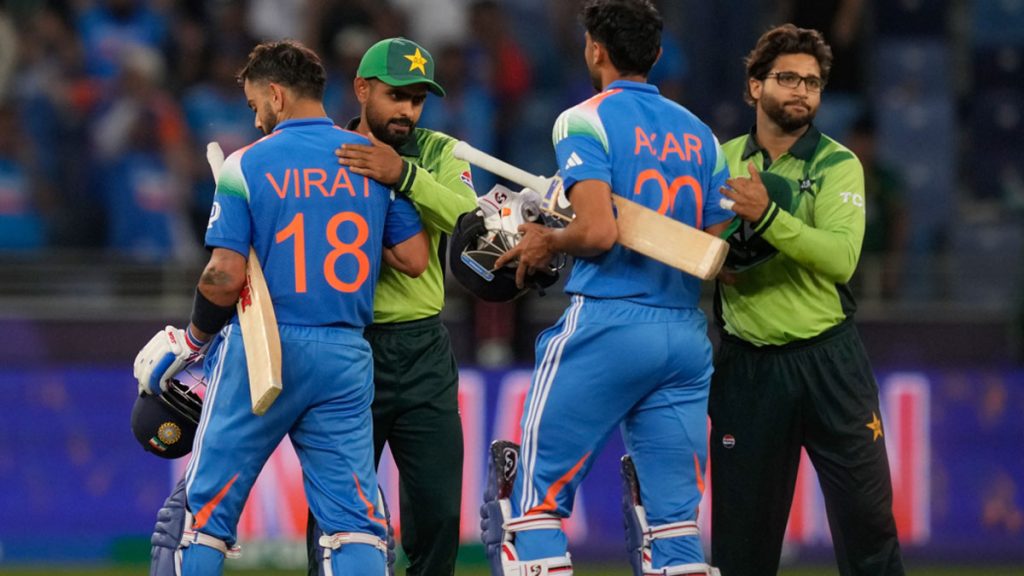“Pakistan’s uncomfortable truth: an outdated approach and lack of intent” is a reality that cannot be ignored. In cricket, “intent” has become a buzzword, often used casually as a shorthand analysis that conveys little meaning. However, in Pakistan’s case, the absence of intent is glaring. It occasionally appears, not through design but by chance, when individual players like Fakhar Zaman or Saim Ayub break from cautious team instructions to follow their instincts. But with both players currently injured, the expectation is for the remaining squad members to elevate their strike rates collectively. Instead, Pakistan stubbornly clings to their cautious approach.
After Pakistan’s 2023 defeat to India, Indian players openly expressed their comfort watching Pakistan struggle against their spin bowlers. Even after forming a seemingly steady partnership, reaching 150 runs with only two wickets lost, their approach was criticized. Fast forward to 2025, and the situation remains unchanged—another match against India and another comfortable victory for them. The uncomfortable truth is clear: Pakistan cricket is not evolving.
There’s a familiar pattern to Pakistan’s defeats in ICC events—one that reveals a stubborn resistance to change. It’s not just the losses themselves, but the timid manner in which they occur. Pakistan continues to revert to an outdated and unsustainable style of play, demonstrating a reluctance to adapt to the demands of modern cricket.
While skill gaps exist, with India boasting superior players, that is not the core issue. If skill alone determined outcomes, Pakistan would struggle to win against such teams. Instead, it is the lack of intent, ambition, and willingness to embrace risk that is problematic. In an era where aggression is essential, Pakistan continues to shy away from it.
The approach of preserving wickets and cautiously building innings is outdated in a landscape defined by proactive cricket. The rationale is straightforward: when facing opponents with superior skills, the logical response is not to retreat but to counter with greater aggression and bolder strokes. Yet, Pakistan seems determined to combat fire with caution, a strategy that is both baffling and unsustainable at the highest levels of the game.
This issue runs deeper than the players on the field. Pakistan’s cricket culture often celebrates bilateral series wins as significant achievements. In contrast, other nations utilize such series to build depth, test new combinations, and nurture talent. Pakistan tends to treat each white-ball bilateral victory as a monumental triumph. This short-sighted focus on immediate results neglects the importance of developing a strong core and addressing the underlying issues of approach and intent.
When faced with inevitable losses in big events, the response is predictable: coaches are fired, selectors are dismissed, and captains are questioned. Camps are hastily organized, as if merely repeating the process will address deep-rooted structural flaws. Individual players are often blamed, while the collective approach is rarely genuinely scrutinized. Even when the issue of intent arises, it is often overshadowed by discussions about fitness or skill training, conveniently diverting attention from fundamental truths.
In 2025, cricket demands intent first and foremost. Ironically, a team that may not always possess superior skills—like Pakistan—needs to prioritize intent more than ever. Higher intent can compensate for technical flaws, bridge skill gaps, and build scoreboard pressure, as evidenced by teams with fewer resources. Yet Pakistan seems to defy this logic, matching inferior skill with a lack of intent, leading to predictable disappointments.
What Pakistan cricket requires is not another reactionary overhaul of personnel or frantic training camps. Instead, it needs a comprehensive and honest reassessment of its white-ball philosophy. Anything less will result in a continuation of the same outcomes and the same confusing conversations following each failure.
Until intent becomes the primary focus rather than an afterthought, Pakistan will continue to experience repeated defeats.

